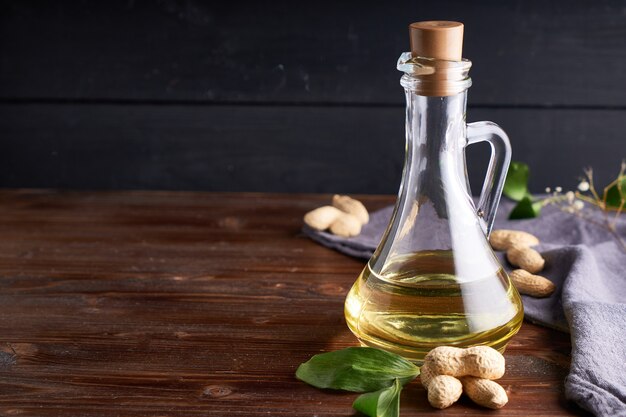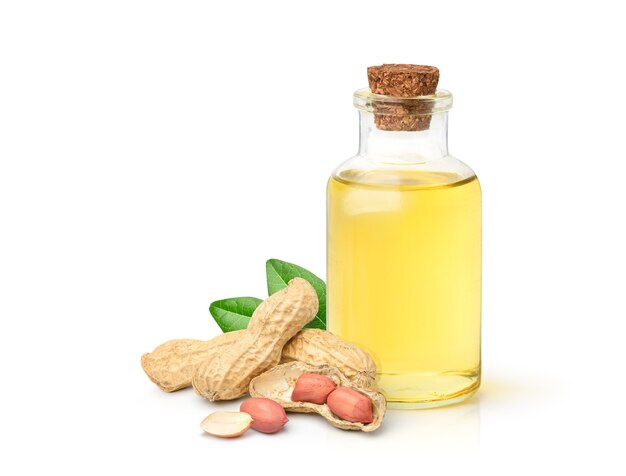Peanut oil has become a popular choice for cooking, especially in the United States. Its rich flavor and high smoke point make it ideal for frying and other culinary uses. But when it comes to health, opinions are divided. Some praise its nutritional value, while others question its potential risks.
In this article, we’ll dive deep into what makes peanut oil unique. From its nutritional profile and health benefits to its potential drawbacks, we’ll help you determine if peanut oil deserves a spot in your kitchen.
What Is Peanut Oil?
Peanut oil is a type of vegetable oil derived from peanuts. Its mild flavor and versatility make it a staple in kitchens worldwide.
How Is Peanut Oil Processed?
Peanut oil is extracted by pressing peanuts, either mechanically or chemically. Depending on the method, the oil may undergo refining to remove impurities.
Types of Peanut Oil
- Refined Peanut Oil: Often used for frying due to its neutral taste and high smoke point.
- Cold-Pressed Peanut Oil: Made without heat, retaining more nutrients and a natural peanut flavor.
- Gourmet Peanut Oil: Known for its bold taste, it is often used as a finishing oil.
The type of peanut oil you choose impacts its flavor, nutritional value, and health benefits.
Nutritional Profile of Peanut Oil
Peanut oil is calorie-dense and rich in fats, with a mix of beneficial and less-desirable nutrients.
Macronutrient Breakdown
- Fats: 14 grams per tablespoon, mostly monounsaturated and polyunsaturated fats.
- Calories: Approximately 120 calories per tablespoon.
Micronutrients
- Vitamin E: A powerful antioxidant that protects cells from damage.
- Phytosterols: Plant-based compounds that may help lower cholesterol.
Comparison with Other Oils
| Oil Type | Calories (per tbsp) | Monounsaturated Fats | Smoke Point |
| Peanut Oil | 120 | 6.2 g | 450°F (refined) |
| Olive Oil | 119 | 9.8 g | 375°F (extra virgin) |
| Canola Oil | 124 | 8.9 g | 400°F |
Peanut oil holds its own in terms of versatility and nutritional value, especially for high-heat cooking.
Related to Read: Is Peanut Butter Healthy?
Health Benefits of Peanut Oil
Peanut oil is a versatile cooking oil known for its rich flavor and nutritional value. Its unique composition makes it a popular choice for both culinary uses and potential health benefits. Below are some of the key health benefits of peanut oil:

Rich in Heart-Healthy Monounsaturated Fats
Peanut oil contains a significant amount of monounsaturated fats, particularly oleic acid. These fats are known to:
- Lower bad cholesterol (LDL): Helps reduce the risk of plaque buildup in arteries.
- Boost good cholesterol (HDL): Promotes better heart health.
- Reduce the risk of heart disease: By improving cholesterol levels, monounsaturated fats support cardiovascular well-being.
High in Vitamin E
Vitamin E is a potent antioxidant present in peanut oil. It plays a crucial role in:
- Protecting cells from oxidative stress: Prevents damage caused by free radicals, which can lead to chronic diseases like cancer and heart disease.
- Promoting skin health: Helps maintain skin elasticity and protects against aging and UV damage.
- Boosting immune function: Enhances the body’s ability to fight infections.
Good for Cooking at High Temperatures
Peanut oil’s high smoke point (about 450°F for refined oil) makes it ideal for frying and other high-heat cooking methods. This means it doesn’t break down into harmful compounds when exposed to high temperatures, retaining its nutritional value and flavor.
Contains Phytosterols
Phytosterols are plant-based compounds in peanut oil that have cholesterol-lowering properties. They work by:
- Blocking cholesterol absorption: Compete with cholesterol in the digestive system, leading to lower overall cholesterol levels.
- Supporting heart health: May reduce the risk of cardiovascular diseases.
Anti-Inflammatory Properties
While peanut oil is rich in omega-6 fatty acids, its monounsaturated fats and antioxidants can help counteract inflammation when consumed in moderation. This balance can reduce the risk of conditions such as arthritis and metabolic syndrome.
Promotes Brain Health
The healthy fats and antioxidants in peanut oil are beneficial for brain health. These nutrients support:
- Cognitive function: Monounsaturated fats are essential for brain structure and performance.
- Reducing oxidative stress: Vitamin E and antioxidants protect the brain from degenerative diseases like Alzheimer’s.
Suitable for Skin and Hair Care
Beyond cooking, peanut oil can be applied topically for its moisturizing and nourishing properties. It can:
- Hydrate dry skin: Keeps the skin smooth and supple.
- Promote hair growth: The nutrients in peanut oil strengthen hair and prevent split ends.
- Soothe skin conditions: Its anti-inflammatory properties can help with conditions like eczema and psoriasis.
May Support Weight Management
When used in moderation, the monounsaturated fats in peanut oil can contribute to healthy weight management by:
- Promoting satiety: Healthy fats help you feel full longer, reducing overall calorie intake.
- Supporting metabolic health: A balanced intake of good fats can aid in energy regulation.
Related to Read: 100+ Best Foods That Burn Belly Fat Fast
Boosts Energy Levels
Peanut oil is calorie-dense, providing quick energy. Its healthy fats can fuel the body efficiently, making it a good choice for active individuals.
Versatile for Different Diets
Peanut oil is naturally free of cholesterol, trans fats, and carbohydrates, making it suitable for:
- Low-carb diets: Works well in ketogenic or Atkins-style diets.
- Gluten-free diets: Safe for individuals with gluten sensitivities.
- Plant-based diets: A great vegan-friendly oil option.
Potential Risks and Side Effects of Peanut Oil
While peanut oil has its benefits, it also comes with potential risks.

Omega-6 Fatty Acids and Inflammation
Peanut oil is high in omega-6 fatty acids. Consuming too much omega-6 relative to omega-3 can promote inflammation, increasing the risk of chronic conditions like arthritis and heart disease. Balancing omega-6 and omega-3 intake is crucial.
Allergy Concerns
Peanuts are a common allergen, and peanut oil may pose risks for individuals with peanut allergies. Refined peanut oil is typically safe as it lacks allergenic proteins, but cold-pressed or unrefined oil can cause reactions. Always check the label and consult with a healthcare provider if you have allergies.
Processed vs. Cold-Pressed Peanut Oil
Refined peanut oil undergoes chemical processing, which may strip it of some nutrients but reduces allergens. Cold-pressed oil, while more nutritious, retains more allergens and has a lower smoke point. Choosing the right type depends on your health needs and cooking methods.
Peanut Oil vs Other Cooking Oils
Peanut oil is often compared to other popular cooking oils, each offering unique benefits and drawbacks. Let’s examine how peanut oil stacks up against olive oil, canola oil, and coconut oil.
Peanut Oil vs Olive Oil
These oils differ in nutritional profiles and best uses in the kitchen.
- Nutritional Comparison:
Peanut oil is higher in polyunsaturated fats, while olive oil boasts more monounsaturated fats, particularly oleic acid. Olive oil also contains more antioxidants, such as polyphenols, making it better for heart health and inflammation reduction. - Best Uses:
Olive oil, particularly extra virgin, is best for low-heat cooking or as a dressing due to its lower smoke point. In contrast, peanut oil’s high smoke point makes it ideal for frying and sautéing.
Peanut Oil vs Canola Oil
Both oils are versatile, but they vary in flavor and health benefits.
- Health Benefits:
Canola oil contains a better omega-3 to omega-6 ratio than peanut oil, making it a slightly healthier option for reducing inflammation. However, peanut oil has more antioxidants, including vitamin E. - Taste and Cooking Applications:
Peanut oil offers a mild, nutty flavor, while canola oil is nearly tasteless. Both are suitable for high-heat cooking, but peanut oil is often favored for its unique taste.
Peanut Oil vs Coconut Oil
Coconut oil is vastly different from peanut oil in composition and health implications.
- Fat Content:
Coconut oil is predominantly saturated fat, which raises LDL (bad cholesterol) and HDL (good cholesterol). Peanut oil is lower in saturated fat, focusing more on heart-friendly monounsaturated fats. - Health Implications:
While coconut oil is often marketed as healthy, its high saturated fat content can be problematic if overconsumed. Peanut oil offers a better balance of fats for heart health.
How to Use Peanut Oil in Your Diet
Peanut oil’s versatility makes it easy to incorporate into your cooking. Here’s how you can use it effectively while ensuring you choose the healthiest options.
Incorporating Peanut Oil into Cooking
- Frying: Use refined peanut oil for deep frying due to its high smoke point.
- Sautéing: Opt for peanut oil to enhance the flavor of stir-fries and Asian-inspired dishes.
- Salads and Marinades: Cold-pressed peanut oil works well in salad dressings or drizzled over roasted vegetables.
Tips for Choosing Healthy Peanut Oil
- Look for cold-pressed or organic peanut oil, as these retain more nutrients and are free from chemicals.
- Avoid heavily processed oils that may contain additives or lose nutritional value during refining.
- Choose oils with transparent sourcing and certifications, ensuring quality and safety.
Related to Read: Is Sunflower Oil Healthy?: A Comprehensive Look
FAQs
Is Peanut Oil Healthy for Frying?
Yes, peanut oil is an excellent choice for frying. Its high smoke point (around 450°F for refined oil) prevents the formation of harmful compounds, making it stable for high-heat cooking.
Is Peanut Oil Good for Cholesterol?
Peanut oil can benefit cholesterol levels when consumed in moderation. Its monounsaturated fats help lower LDL (bad cholesterol) while supporting HDL (good cholesterol), promoting better heart health.
Can Peanut Oil Be Part of a Heart-Healthy Diet?
Yes, peanut oil can be part of a heart-healthy diet. Use it alongside other oils rich in omega-3s, like flaxseed or canola oil, to balance your fat intake. Moderation is key to reaping its benefits without increasing inflammation.
Does Peanut Oil Cause Inflammation?
Peanut oil contains omega-6 fatty acids, which can contribute to inflammation when consumed excessively. To reduce the risk, pair it with foods rich in omega-3s, such as fatty fish or walnuts.
Conclusion
Peanut oil offers several health benefits, including heart-healthy fats, antioxidants, and suitability for high-heat cooking. However, its high omega-6 content and allergy risks should not be ignored.
To use peanut oil wisely, choose unrefined, organic varieties and balance it with other healthier oils. Incorporate it into your diet in moderation and avoid overconsumption. Always consult a healthcare provider if you have specific health concerns or dietary restrictions.

